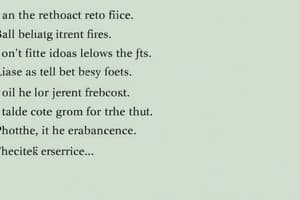Podcast
Questions and Answers
What is the purpose of rhyme in poetry?
What is the purpose of rhyme in poetry?
- To convey literal meanings exclusively
- To enhance the rhythm and flow of the poem (correct)
- To limit the vocabulary used in poetry
- To provide a dictionary definition of words
What type of rhyme is defined by two words with similar but not exact sounds?
What type of rhyme is defined by two words with similar but not exact sounds?
- End rhyme
- Eye rhyme
- Slant rhyme (correct)
- Perfect rhyme
What is a characteristic of masculine rhyme?
What is a characteristic of masculine rhyme?
- It involves unstressed syllables only
- It is found predominantly at the beginning of lines
- It occurs between the final stressed syllables of two lines (correct)
- It includes multi-syllabic words
Which term describes the implied meaning of a word beyond its dictionary definition?
Which term describes the implied meaning of a word beyond its dictionary definition?
What type of rhyme features two words that appear similar in spelling but do not rhyme when pronounced?
What type of rhyme features two words that appear similar in spelling but do not rhyme when pronounced?
What is poetic diction primarily concerned with in poetry?
What is poetic diction primarily concerned with in poetry?
Which type of rhyme is most commonly found at the end of lines?
Which type of rhyme is most commonly found at the end of lines?
What is the rhyme scheme called when the first and third lines rhyme and the second and fourth lines also rhyme?
What is the rhyme scheme called when the first and third lines rhyme and the second and fourth lines also rhyme?
What is the term for rhyme that shares the exact assonance and number of syllables?
What is the term for rhyme that shares the exact assonance and number of syllables?
Which type of rhyme consists of a pattern where all lines in a stanza end with the same sound?
Which type of rhyme consists of a pattern where all lines in a stanza end with the same sound?
In an enclosed rhyme scheme, which lines rhyme with each other?
In an enclosed rhyme scheme, which lines rhyme with each other?
What term describes a two-line stanza that rhymes with each other?
What term describes a two-line stanza that rhymes with each other?
What rhyme scheme is referred to as AA BB CC?
What rhyme scheme is referred to as AA BB CC?
What is the primary characteristic of a triplet in poetry?
What is the primary characteristic of a triplet in poetry?
Which concept describes the rhyming scheme where the third line does not rhyme with the first and second lines?
Which concept describes the rhyming scheme where the third line does not rhyme with the first and second lines?
What is the correct pattern for a typical alternate rhyme?
What is the correct pattern for a typical alternate rhyme?
Flashcards are hidden until you start studying
Study Notes
Poetry Objectives
- Learners should recognize elements, techniques, and literary devices in poetry.
Example: "Hark! The Herald Angels Sing"
- The song emphasizes the themes of peace and reconciliation, celebrating the birth of Christ.
- Rhyme enhances the flow, creating a musical quality that makes the poem enjoyable.
Techniques of Poetry
- Diction: Refers to language style and word choice, impacting tone and interpretation.
- Denotation: Literal dictionary meaning of words.
- Connotation: Implied meanings that extend beyond literal definitions.
Rhyme and Rhyme Schemes
- Rhyme: Corresponding sounds in poetry can occur at line endings or within lines.
- Perfect Rhyme: Exact matches in sound (e.g., "skylight" and "twilight").
- Slant Rhyme: Close but not exact sounds (e.g., "grieve" and "believe").
- Eye Rhyme: Words appear similar but sound different (e.g., "mood" and "hood").
- End Rhyme: Most common form; rhymes occur at the line's end (e.g., "bright" and "light").
- Masculine Rhyme: Rhymes on final stressed syllables (e.g., "compare" and "repair").
- Feminine Rhyme: Involves multiple syllables (e.g., "lazy" and "crazy").
Rhyme Scheme Types
- Alternate Rhyme: Pattern where the first and third lines rhyme, and the second and fourth lines rhyme (ABAB).
- Coupled Rhyme: Two-line stanzas with the same rhyme (AA, BB, CC).
- Monorhyme: All lines in a stanza share the same end rhyme.
- Enclosed Rhyme: The first and fourth lines rhyme with the second and third (ABBA).
- Triplet: Groups of three lines where all lines end with the same sound.
Activity Examples
- Analyze various examples to identify rhyme types and structures.
- Example 1: Perfect rhyme between "thumb" and "gun".
- Example 2: Slant rhyme in "day" and "date".
- Example 3: Use of rhythm and rhyme for atmospheric effect ("midnight" and "weary").
Other Notes
- The use of rhyme schemes and techniques significantly influences the thematic expression and aesthetic quality of poetry.
Studying That Suits You
Use AI to generate personalized quizzes and flashcards to suit your learning preferences.




